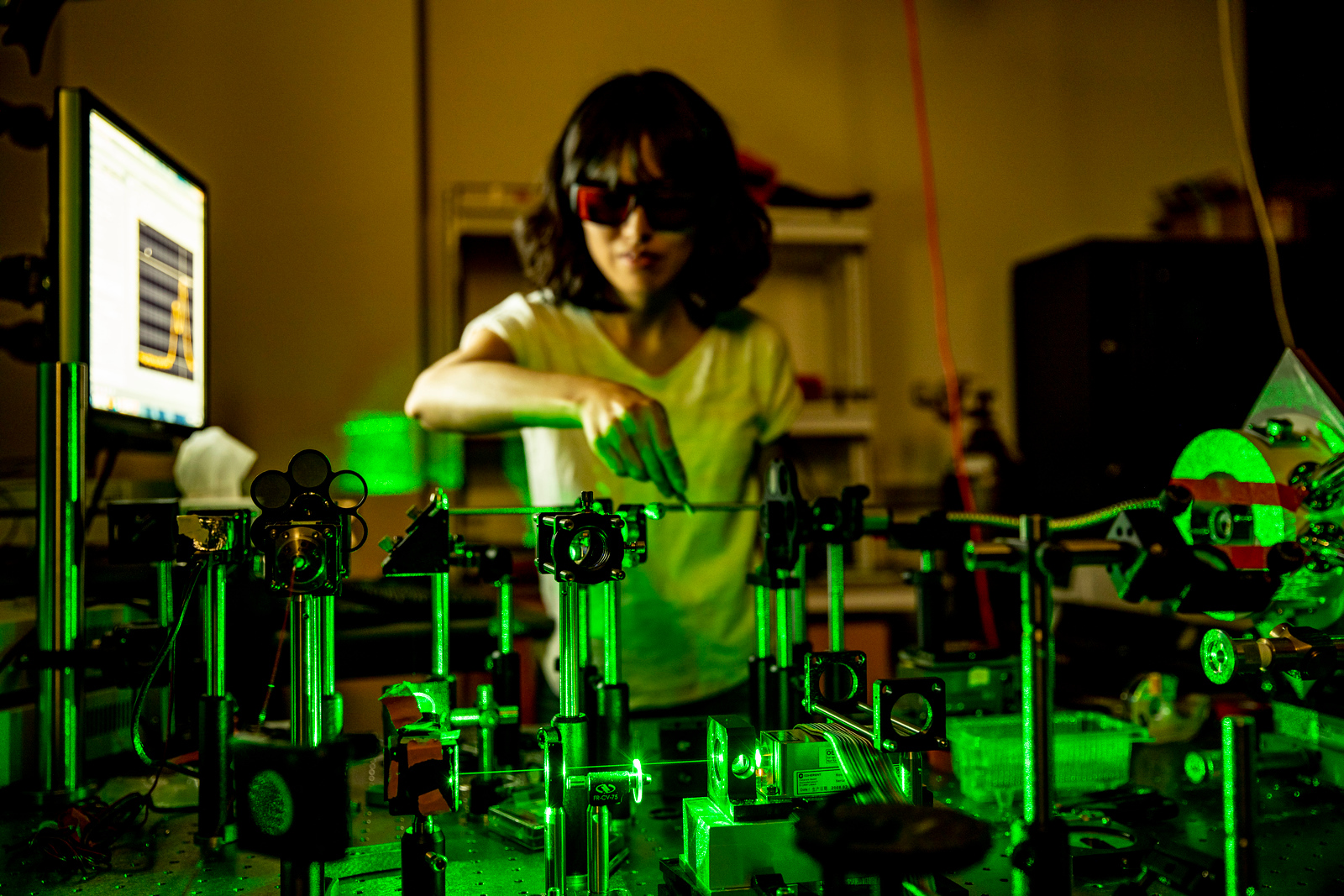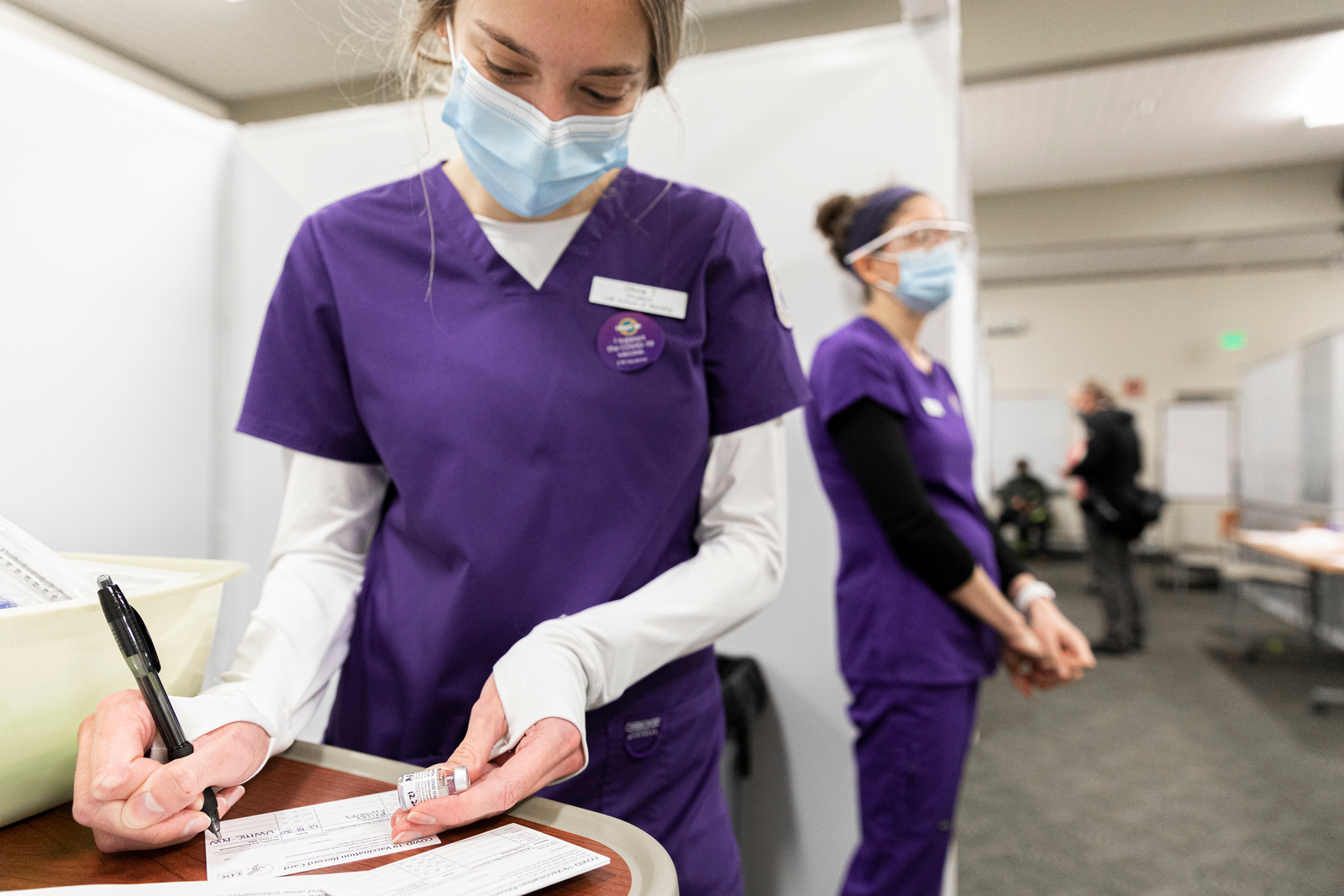Biomedical Graduate Education
The School of Medicine provides scientific training toward graduate degrees in biomedical research in a resource-rich, collaborative environment. Prospective students may apply to more than one program within the school. Applications must be completed using the UW Graduate School’s central application process. Applicants should also closely follow the instructions provided by the specific program(s) to which they are applying.
Need-based application fee waivers are available. More information on criteria for eligibility and how to apply is provided by the UW Graduate School.

Biochemistry
The Department of Biochemistry in the School of Medicine offers a Ph.D. graduate program to prepare for a successful career in biochemistry research.
Biochemistry includes the structure and function of the protein, RNA, and membrane components that carry out life processes. It also includes regulation of the genes that encode these components, functional integration of these components within cells and tissues, and coordination of the myriad components responsible for complex behaviors in unicellular and multicellular organisms. Progress in basic science leads to progress in understanding the causes, diagnosis, and treatment of human diseases as diverse as cancer, obesity, muscular dystrophy, and malaria.
Bioengineering
The Department of Bioengineering is part of both the School of Medicine and the College of Engineering at UW. Bioengineering offers a Ph.D. graduate program to prepare for a successful career in multidisciplinary research.
The UW Bioengineering department research themes include:
- Biomaterials & regenerative medicine
- Instrumentation, imaging and image-guided therapy
- Molecular & cellular engineering
- Neural engineering
- Systems, synthetic & quantitative biology
- Technology for expanding access to healthcare
Biological Physics, Structure & Design (BPSD)
The UW Biological Physics, Structure & Design (BPSD) program is an interdisciplinary Ph.D. program with participating faculty from the following departments and affiliates:
- Bioengineering
- Biochemistry
- Biological structure
- Chemistry
- Fred Hutch Cancer Center
- Medicinal chemistry
- Pharmacology
- Physiology & biophysics
Prospective students apply to the BPSD program. BPSD graduating students receive a PhD from their faculty advisor’s department.
The interface between the physical and biological sciences is a rapidly emerging research area. The BPSD program focuses on the study of how the basic molecular components that provide the building blocks of biological systems work.
Biomedical & Health Informatics
The Department of Biomedical Informatics & Medical Education (BIME) in the UW School of Medicine offers a Ph.D. program in Biomedical & Health Informatics.
The emphasis is on the science of Biomedical and Health Informatics, rather than on computer implementations or technology transfer of known methods to biomedical domains. The study of biomedical information leads to a set of core research questions about biomedical data and knowledge representation, knowledge and information retrieval, and information and technology use.
Genome Sciences
The Department of Genome Sciences in the School of Medicine offers a Ph.D. graduate program to prepare graduates for a variety of careers including research and teaching in academia, research in the biotech industry, and the communication of science to the public.
Genome sciences research areas include:
- Model organism genetics
- Human & medical genetics
- Genomics & proteomics
- Computational biology
Global Health Metrics & Implementation Science
The Department of Global Health is part of both the School of Medicine and the School of Public Health at UW.
The Department of Global Health and the Department of Health Metrics Sciences offer an interdisciplinary PhD program in Global Health with two tracks:
- Implementation Science
- Metrics Sciences
Implementation Science track focuses on the systematic application of scientific approaches to ask and answer questions regarding evidence of of intervention efficacy to implementation. Students in this track of the PhD program are typically matched with a faculty advisor in the Department of Global Health.
Metrics Sciences track focuses on identifying the world’s major health problems, assessing how well society addresses the problems, and guiding resource allocation to maximize health improvements. Students in this track are typically matched with a faculty advisor in the Department of Health Metrics Sciences.
Immunology
The Department of Immunology in the School of Medicine offers a Ph.D. graduate program to prepare graduates for science careers in academic and industrial research.
Immunology Ph.D. program emphasizes the connections between the immune system and other biological systems in health and disease, and provides the opportunity to pursue an understanding of immune responses from the cellular, molecular and systems biology perspective.
Molecular Medicine & Mechanisms of Disease (M3D)
The Molecular Medicine and Mechanisms of Disease (M3D) program is an interdepartmental Ph.D. program among the School of Medicine Department of Laboratory Medicine & Pathology, Seattle Children’s Research Institute (SCRI), and the Fred Hutch Cancer Center (FHCC).
M3D students receive training designed to prepare them for translational research. A key feature of the M3D PhD program is dual mentorship for each student. Thesis research is supervised by two mentors, one a basic scientist (the Research Mentor) and the other a clinician scientist (the Clinical Mentor), enabling students to complement their experimental work with exposure to relevant problems in the clinic.
Microbiology
The Department of Microbiology in the School of Medicine offers a Ph.D. program in preparation for a career in research.
Microbiology faculty study in two major research areas, virology and bacteriology. While the majority of faculty members have research laboratories within the South Lake Union Campus and at the Health Sciences Building, several faculty work at the Fred Hutchinson Cancer Center, Seattle Children’s Research Institute and at the Northwest Regional Primate Research Center.
Molecular & Cellular Biology (MCB)
The Molecular & Cellular Biology (MCB) program is an interdisciplinary Ph.D. program jointly offered by the UW and the Fred Hutchinson Cancer Center.
The MCB graduate program encompasses more than 200 laboratories at UW, Fred Hutch, Pacific Northwest Research Institute (PNRI), Seattle Children’s Research Institute (SCRI), Benaroya Research Institute (BRI), and the Allen Institute.
Common research areas of interest for MCB faculty and students include:
- Biophysical and structural biology
- Cancer biology
- Cell signaling & cell/environment interactions
- Computational biology
- Developmental biology, stem cells & aging
- Gene expression, cell cycle & chromosome biology
- Genetics, genomics & evolution
- Microbiology, infection & immunity
- Neuroscience
Fred Hutch Cancer Center is an independent organization that also serves as UW Medicine’s cancer program.
Neurobiology & Biophysics
The Department of Neurobiology & Biophysics recruits graduate students through interdisciplinary graduate programs at the University of Washington. Prospective students with an interest in Neurobiology & Biophysics are encouraged to apply to one of the several interdisciplinary Ph.D. programs, in which our faculty are active participants. Our faculty welcome rotations from first year students and several students from these programs join NBIO labs each year to pursue their graduate research.
The list of the programs from which NBIO recruits include the following:
Neuroscience
The Graduate Program in Neuroscience (GPN) is an interdisciplinary Ph.D. program affiliated with over 30 schools, departments, programs and institutions.
The goal of the program to provide interdisciplinary training drawing from a variety of topics, techniques, and perspectives, including neuroanatomy, biochemistry, molecular biology, physiology, biophysics, pharmacology, in vivo brain imaging (e.g., fMRI, M-EEG), computational modeling and behavior. Graduates are prepared to conduct independent research and equipped to pursue a variety of career paths.
Pathobiology
The Department of Global Health is part of both the School of Medicine and the School of Public Health at UW and offers a multidisciplinary PhD program in Pathobiology.
Pathobiology ties together biology, medicine, and public health, particularly as applied to global health issues. The program applies a multidisciplinary approach as well as the latest research technologies to the study of public health problems such as viral, bacterial and parasitic diseases, as well as other conditions such as cancer.
Pharmacology
The Department of Pharmacology in the School of Medicine offers a PhD program designed to prepare students for careers in science and medicine that encompass academia, industry, scientific communications, public health, and beyond.
Pharmacology utilizes cellular and molecular biology, biochemistry, structural biology, biophysics, genetics, physiology, and neurobiology as tools to design and discover new therapeutics and to better understand what happens when the human body is in a disease state.
Areas of research emphases include:
- Gene architecture & action
- Intracellular signaling
- Molecular basis of disease
- Neurobiology & behavior
- Protein structure
- Drug discovery & precision medicine
Rehabilitation Science
The Department of Rehabilitation Science in the School of Medicine offers a PhD program that prepares researchers, educators, and leaders in rehabilitation practice, research, and policy.
The Rehabilitation Science PhD program accepts applications every other year.
Rehabilitation Science is an interdisciplinary field that focuses on human function and disability. Basic and applied research from health sciences, social sciences, engineering, and related fields are directed toward:
- Enhancing physical and psychosocial functioning, participation in life situations, and quality of life of people with disabilities
- Informing relevant social and health care policy
Most biomedical research PhD programs offer competitive salary with healthcare benefits and tuition waivers through Research Assistant (RA) or Teaching Assistant (TA) positions to students in good academic standing.
- Biomedical Research PhD Programs
- Biomedical Research variable RA salary for 2024-2025: $3917/month
- Graduate Appointee Insurance Program (GAIP)
- UW Graduate Tuition and Fees
Contact the programs directly for more information.
Medical Science Training Program (MSTP)
MD/PhD
Students admitted to the MSTP program have access to all of the PhD programs above for the PhD portion of their training.

Masters Programs
Applied Bioengineering
The Master of Applied Bioengineering (MAB) is a one year (Mid-August/Early Start to August of the following year), full time professional master’s degree program.
The Master of Applied Bioengineering program trains students to apply engineering design to address today’s clinical challenges and fulfill the market-based demands of industry and medicine for biotechnology. Students collaborate with world-class faculty from UW and UW Medicine, and local industry partners to transform biomedical research into technologies for improving patient care. Graduates have in-demand skills for work in biomedical industry and translational research.
Bioengineering
Bioengineering’s thesis-based Master of Science (MS) students bring diverse experience from a variety of academic disciplines to solve biomedical problems using basic science and engineering principles while gaining comprehensive research experience.
The Bioengineering MS is a two-year, fulltime program that prepares students for careers in academia or industry, or to pursue advanced degrees. MS students conduct a significant research project in a faculty lab, and defend a thesis documenting their work. Beyond the research project, MS students complete a year of coursework.
Bioethics
Our flexible two-year, in-residence Master of Arts (MA) in Bioethics program provides students with the foundational knowledge, skills, and experience to enrich their careers and broaden their competency in bioethics.
The Bioethics MA program offers training in research and clinical aspects of bioethics as well as empirical and normative methods of analysis. Students have the opportunity to study with diverse and well-respected faculty from the University of Washington, the Treuman Katz Pediatric Bioethics Center, and the Seattle Veteran’s Health Administration. The program helps prepare students to teach, publish, and conduct research that incorporates bioethical analysis.
Biomedical & Health Informatics
Biomedical & Health Informatics (BHI) Master of Science (MS) program offered by the Department of Biomedical Informatics & Medical Education (BIME) is a nationally renowned program that stresses the synergy between teaching, research, and practice. This program is partially funded by an NLM training grant and offers fulltime research-focused training that prepares students for careers in research, teaching and information management in academia, within healthcare organizations, and in the healthcare computing industry.
Comparative Medicine
Comparative Medicine offers a thesis-based Master of Science (MS) program, which often occurs in conjunction with the Clinical Residency Training Program in Laboratory Animal Medicine (LAM).
The overall goal of the MS program is to train graduate students and LAM residents in Comparative Biomedical Research, which frequently involves the utilization of animal models and cutting-edge research techniques to make significant advances in human and animal medicine. This is accomplished through mentorship with a faculty member and full participation in a hypothesis-based research project that results in the publication of a thesis.
Health Metrics Sciences
Students in the Health Metrics Sciences Master of Science (MS) program develop quantitative, data science, and research skills, alongside an understanding of the health metrics concepts, methods, and data sources required to meet the challenge of measuring and improving the health of the world’s population. Graduates will have mastered the technical skills and contextual knowledge required to produce, interpret, and effectively communicate health metrics estimates and research across a diversity of settings.
Laboratory Medicine
Laboratory Medicine & Pathology offers a Master of Science (MS) degree in Laboratory Medicine that prepares graduates for advanced technical and supervisory positions in clinical and research laboratories as well as pharmaceutical, diagnostic, and regulatory industries. Within the field of Laboratory Medicine itself, there are several pathways that a MS student might identify as an area for further education and training while in the MS program.
Pharmaceutical Bioengineering
The Master of Pharmaceutical Bioengineering (PharBE) is a part-time interactive online program designed to enable working engineers, scientists, researchers and professionals in the biotechnology, pharmaceutical and related industries to explore advanced education in the areas of drug discovery and design, pharmaceutics and translational pharmaceutics, clinical drug and device development, molecular and cellular biology, pathophysiology and pharmacology. Using live (synchronous), and pre-recorded (asynchronous) lectures, the program provides a path to acquire new skills, gain an edge in your current job, and receive training to transition to a new career in the biotechnology or pharmaceutical industry.
Public Health
Global Health’s Master of Public Health (MPH) program offers a social justice and practical skills-based framework. Student obtain core public health skills in research, analytic methods, proposal development, management, implementation science, health metrics and evaluation, and a deeper understanding of the social, economic, and political determinants of health.

Living in Seattle
The Seattle metropolitan area is a vibrant and dynamic blend of urban living, exciting innovations, and breathtaking natural beauty. Seattle consists of numerous diverse and eclectic neighborhoods that provide a sense of local and walkable communities within a large urban metro.
Nestled between the Puget Sound and the Cascade Mountains, the options for year-round recreational activities abound. Hundreds of miles of trails, lakes, and snow activities are all within an easy day-trip from the metro area. There is always something to do in Seattle.
New incoming UW graduate students are encouraged to take a look at the U501 self-guided, online orientation at grad.uw.edu/u501 (NetID login required).